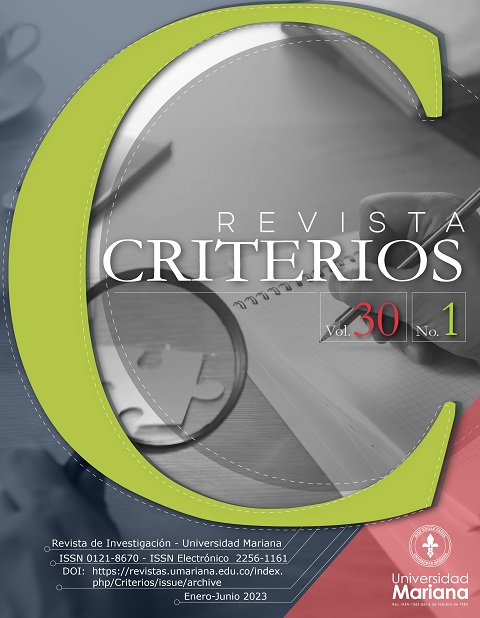Inclusive education as a strength of pedagogical practice in the classroom
DOI:
https://doi.org/10.31948/rev.criterios/30.1-art8Keywords:
inclusive, teacher training, digital proposal, OVAAbstract
Over the years, inclusion has been implemented in different educational establishments in the country, regardless of whether or not it has been correctly implemented. Therefore, it is important to know the concept and its practice, to reach the central objective set for this research, which emphasizes strengthening teacher training in the process of educating for inclusion, in elementary school teachers of the Municipal Educational Institution Chillurco, municipality of Pitalito, Huila. The methodology used in this qualitative study focuses on the hermeneutic paradigm, and action research type; the following data collection instruments were used: open-ended survey and focus groups, developed with seven elementary school teachers of the institution; this allowed evidencing not only a strong lack of knowledge about inclusive education and the way it should be put into practice within the teaching profession but also the great need to strengthen this knowledge and the strategies of the teaching profession in terms of inclusive education. Therefore, according to what was evidenced, the digital proposal of a virtual learning object -a digital tool that facilitates the development of self-learning skills- arose; it is a free and open-source software with pedagogical sequences guided by teachers, aimed at students. Its creation was designed to provide different strategies and digital methodologies for the proper implementation of inclusive education in the institution.
Author Biographies
Angela Ibeth Restrepo Riaños, Institución Educativa Chillurco de Pitalito, Huila
Magíster en Pedagogía; Licenciada en Educación Básica con énfasis en Ciencias Sociales y Cultura Democrática. Docente de la Institución Educativa Chillurco de Pitalito, Huila.
Daniela García Duran, Fundesarrollo Pitalito, Huila.
Magíster en Pedagogía; Psicóloga. Profesional de apoyo psicosocial en Fundesarrollo Pitalito, Huila.
References
Aguirre-Dávila, E. (2015). Prácticas de crianza, temperamento y comportamiento prosocial de estudiantes de educación básica. Revista Latinoamericana de Ciencias Sociales, Niñez y Juventud, 13(1), 223-243. https://revistaumanizales.cinde.org.co/rlcsnj/index.php/Revista-Latinoamericana/article/view/1648 DOI: https://doi.org/10.11600/1692715x.13113100314
Ainscow, M. (2016). Haciendo que las escuelas sean más inclusivas: Lecciones a partir del análisis de la investigación internacional. Revista Educación Inclusiva, 5(1), 39-49. https://revistaeducacioninclusiva.es/index.php/REI/article/view/220
Corraliza, J. A. (2001). Vida urbana y experiencia social: variedad, cohesión y medio ambiente. Boletín CF+ S, (15). http://habitat.aq.upm.es/boletin/n15/ajcor.html
Echeita, G. y Duk, C. (2008). Inclusión Educativa. Revista Iberoamericana sobre Calidad, Eficacia y Cambio en Educación, 6(2), 1-8. https://revistas.uam.es/reice/article/view/5436
Hernández, R., Fernández, C. y Baptista, P. (2014). Metodología de la investigación (6.a ed.). McGraw Hill Education.
Izcara, S. (2014). Manual de investigación cualitativa. Fontamara.
Ocampo, A. (2017). Epistemología de la Educación Inclusiva: Un estudio sobre sus condiciones de producción y fabricación del conocimiento [Tesis doctoral, Universidad de Granada]. Repositorio Digibug. https://digibug.ugr.es/handle/10481/49716
Ocete C. (2016). “Deporte inclusivo en la escuela”: diseño y análisis de un programa de intervencion para promover la inclusión del alumnado con discapacidad en Educación Física [Tesis doctoral, Universidad Politécnica de Madrid]. Archivo digital UPM. https://oa.upm.es/39683/
Ochman, M. y Cantú, J. (2013). Sistematización y evaluación de las competencias ciudadanas para sociedades democráticas. Revista Mexicana de investigación Educativa, 18(56), 63-89.
Ordoñez, D. y Ordoñez, M. (2021). Juegos digitales con la aplicación JCLIC para el fortalecimiento de la lectura inferencial de los estudiantes de grado segundo [Tesis de maestría, Universidad de Santander UDES]. Repositorio digital UDES. https://repositorio.udes.edu.co/handle/001/7748
Organización de las Naciones Unidas para la Educación, la Ciencia y la Cultura (Unesco). (2019). Migración, desplazamiento y educación: CONSTRUYENDO PUENTES, NO MUROS. Informe de seguimiento de la educación en el mundo. Unesco
Ortiz, D. (2008). Aportes de la ética relacional a la educación. Sophia, (5), 103-131. https://doi.org/10.17163/soph.n5.2008.04 DOI: https://doi.org/10.17163/soph.n5.2008.04
Ortiz, D. y Robles, D. (2022). Implicaciones de educar para la inclusividad en los espacios de educación superior. Revista Academia y Virtualidad, 15(2), 29-40. https://doi.org/10.18359/ravi.5676 DOI: https://doi.org/10.18359/ravi.5676
Varela, J. (2016). Fernández, M. D., y Fernández, G. F. (coords.) (2016). La escuela de ayer, hoy y mañana. Claves y desafíos. Madrid, España: Dykinson. Educación, 30(58), 273-277. http://dx.doi.org/10.18800/educacion.202101.013 DOI: https://doi.org/10.18800/educacion.202101.013
Walsh, C. (2000). Políticas y significados conflictivos. Nueva sociedad, (165), 121- 133.
How to Cite
Downloads
Downloads
Published
Issue
Section
License
Copyright (c) 2023 Revista Criterios

This work is licensed under a Creative Commons Attribution 4.0 International License.
Revista Criterios es publicada por la Editorial UNIMAR de la Universidad Mariana bajo los términos de la licencia Creative Commons Reconocimiento 4.0 Internacional (CC BY 4.0)

| Article metrics | |
|---|---|
| Abstract views | |
| Galley vies | |
| PDF Views | |
| HTML views | |
| Other views | |




